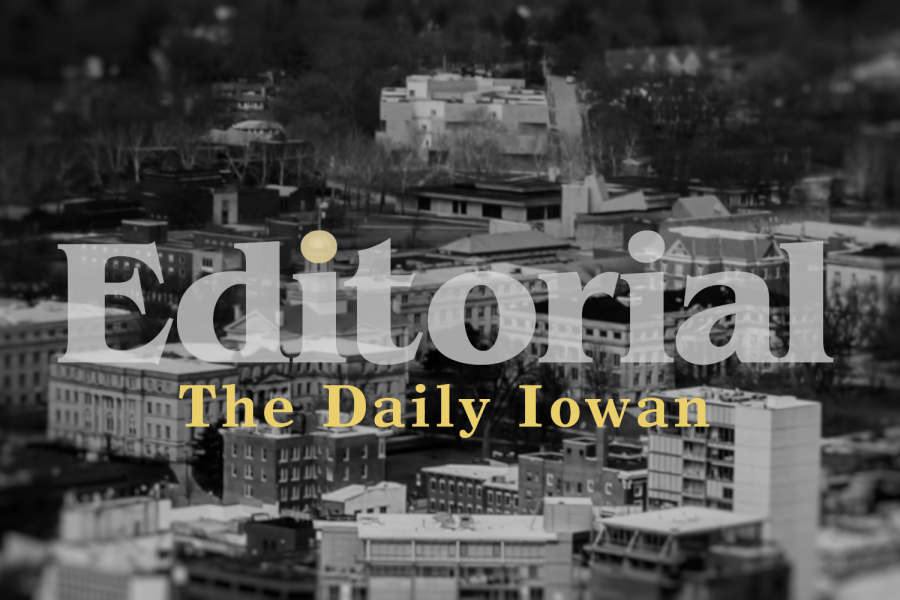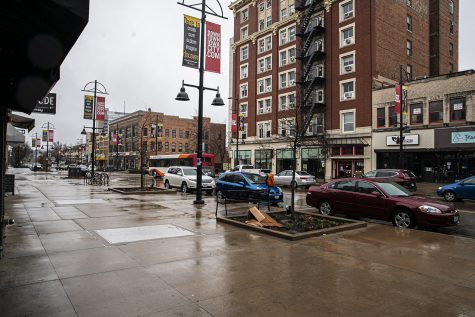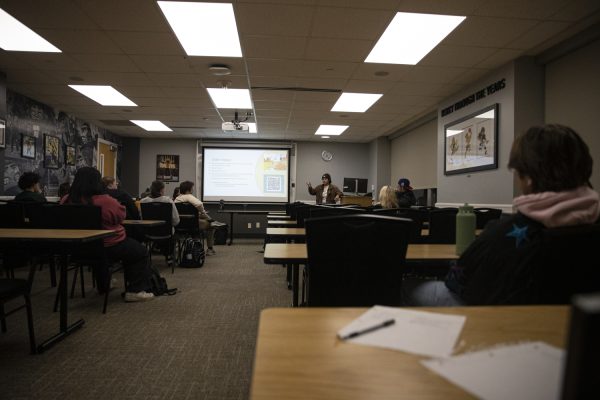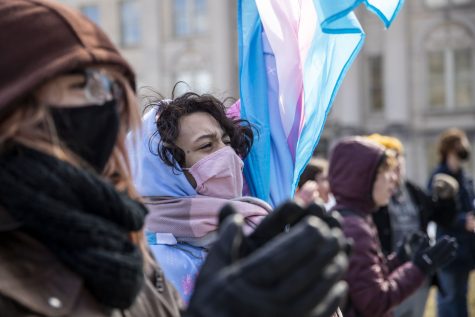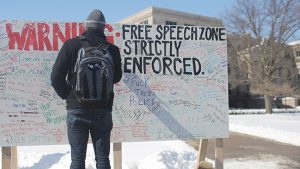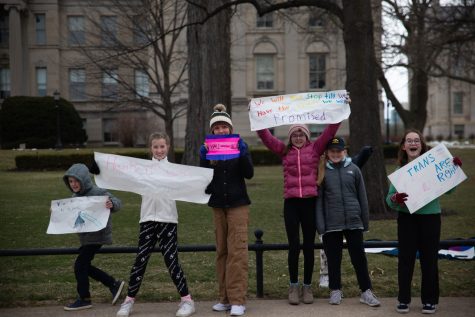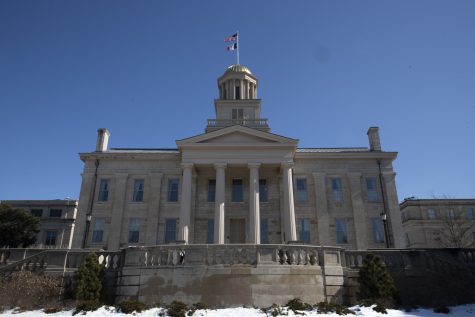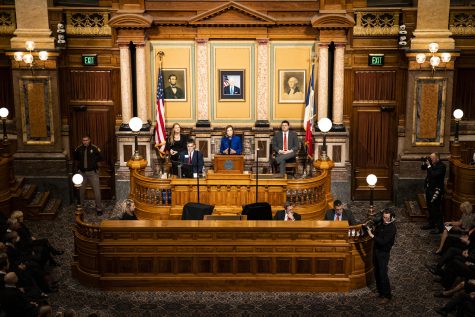Editorial: Students feel effects of UI’s slow response to COVID-19
The administration must work on student-centered solutions to this constantly evolving pandemic.
March 22, 2020
COVID-19 has been the most destructive pandemic for Americans in just over a century.
Everyone needs leadership that not only reacts quickly to the crisis, but also considers every person’s humanity.
For Americans, that leadership starts with President Trump. For Iowans, that includes Gov. Kim Reynolds. For University of Iowa students, that means President Bruce Harreld and the UI administration.
The Daily Iowan Editorial Board implores the UI to communicate frequently and clearly to plan solutions, and ensure that the response process puts students first.
As this pandemic has developed, the UI has been slow to make decisions relative to peer institutions. The Board wrote an editorial on March 11 — nearly two weeks ago — emphasizing the need for robust and timely action from the administration.
It’s essential for the administration to plan and execute the best alternatives to what we all thought would be a normal spring semester.
Since then, the UI has since taken several steps to prioritize public health and student safety. Classes are now online for the remainder of the semester, and Harreld and Provost Montse Fuentes have sent more frequent messages to Hawkeyes.
Yet, the UI has made some clumsy missteps. Students feel more unsteady than ever, with little to no reassurance from the administration concerning key matters such as employment alternatives or navigating academics remotely.
One of the most comprehensive examples is the closing of residence halls. Most students in on-campus housing are required to move out unless the UI has accommodated their continued stay. The move itself is not wrong, and we commend the UI offering pro-rated adjustments to our university bills, but the timing of making the decision after spring break created unnecessary challenges. It’s not logistically or financially feasible or safe for all students to return to pack up their belongings.
Many students went home during spring break, assuming they would be able to return to their residence halls afterward. By closing on-campus housing over break, when many students are not in their rooms, students are either making the trek back to Iowa or now have to rely on roommates and others to ship their belongings to them — sometimes across the country.
If the UI had made the decision sooner, this major logistical debacle could have been avoided.
Students have paid tuition not only for in-person courses, but for access to the libraries, Campus Recreation and Wellness Center, art studios, and other facilities. How will the UI aid student homelessness, food insecurity, and unemployment? What are our options? How will we get through?
Arguably personal to many is the UI’s sudden cancellation of commencement with no established alternatives.
Students depend on the UI. Now, the UI must prove it is capable of being depended on as an institution, and administrators as leaders of a community.
Two members of our Board are scheduled to graduate this May, and are now having to emotionally process this deprivation of celebrating years of hard work. The Board understands why May commencement poses a public-health risk, but the UI owes all Hawkeyes and their families the moment of walking across the commencement stage to receive their diplomas at a later time.
It is not too late for the UI to make a better call in this case. A strong commitment to an alternative celebration would have immense value to the thousands of students who will graduate in May — especially those who are first-generation students. The UI should not tout its support for first-generation Hawkeyes to deny their celebratory moment at a future date.
Iowa State University has already offered graduates the option to return for fall 2020 commencement, as did Indiana University.
It’s great that the UI is working with student-government leaders to poll students on commencement options, which will hopefully save the UI from backlash that the University of California at Los Angeles faced after outright canceling its commencement ceremonies. UCLA walked back on its decision after students urged commencement be postponed rather than canceled. The Board urges the UI to come to the same decision.
As other universities have shared their objectives in finishing this semester successfully, the Board is realizing that the UI is severely lagging in effectively addressing COVID-19.
Closer to home, ISU has redesigned many courses as pass/fail, in order to help protect students who are put at a disadvantage by the forced digitalization of classes. The Daily Tar Heel reports that University of North Carolina – Chapel Hill, in addition to offering a pass/fail option, “students who are unable to complete their work because of hardships presented by COVID-19 will receive a new grade of ‘CV,’ rather than an Incomplete. Students who receive a ‘CV’ will have three more months to complete their work than they would for an Incomplete.”
The university has an obligation to take every step possible to ensure that students still receive an exceptional education and value for their tuition despite the chaos.
There are countless decisions the UI must make in the coming days, weeks, and months.
It’s essential for the administration to plan and execute the best alternatives to what we all thought would be a normal spring semester. This time is anything but, and students need guidance and communication. Extending spring break doesn’t shirk responsibility in offering that assurance.
Students depend on the UI. Now, the UI must prove it is capable of being depended on as an institution, and administrators as leaders of a community.
On an individual level, we encourage Hawkeyes to keep in touch with each other digitally. Social distancing does not have to mean social isolation. Donate to charity, keep the local food banks supplied, and don’t become overwhelmed by fear.
These decisions are neither easy nor ideal by any means, and we appreciate the countless individuals who are putting in overtime to make these tough calls while, in some cases, being hamstrung by the slow responses of other state and federal agencies.
But the university has an obligation to take every step possible to ensure that students still receive an exceptional education and value for their tuition despite the chaos. We’ve been told UI officials have been engaged on this issue for several weeks, so we hope as this evolves to see clearer, more decisive but still measured action, reflecting that deliberation.
Editorials reflect the majority opinion of the DI Editorial Board and not the opinion of the Publisher, Student Publications Inc., or the University of Iowa.
Editorial board members are Marissa Payne, Brooklyn Draisey, Elijah Helton, Becca Bright, and Jason O’Day.



